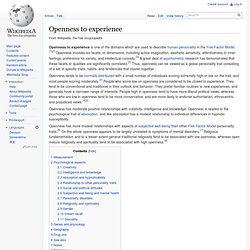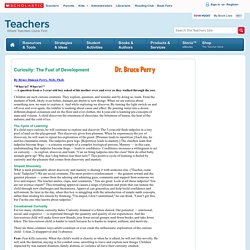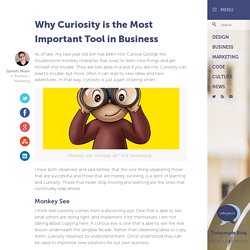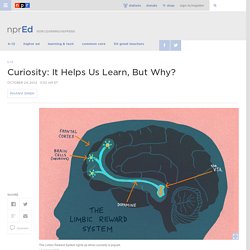

Openess. Openness to experience. Openness to experience is one of the domains which are used to describe human personality in the Five Factor Model.[1][2] Openness involves six facets, or dimensions, including active imagination, aesthetic sensitivity, attentiveness to inner feelings, preference for variety, and intellectual curiosity.[3] A great deal of psychometric research has demonstrated that these facets or qualities are significantly correlated.[2] Thus, openness can be viewed as a global personality trait consisting of a set of specific traits, habits, and tendencies that cluster together.

Openness tends to be normally distributed with a small number of individuals scoring extremely high or low on the trait, and most people scoring moderately.[2] People who score low on openness are considered to be closed to experience. They tend to be conventional and traditional in their outlook and behavior. They prefer familiar routines to new experiences, and generally have a narrower range of interests. Measurement[edit] Are You Really Open-Minded?
Curiosity: The Fuel of Development. "Whas’at?

Whas’at? " —A question from a 3-year-old boy asked of his mother over and over as they walked through the zoo. Children are such curious creatures. They explore, question, and wonder, and by doing so, learn. From the moment of birth, likely even before, humans are drawn to new things. The Cycle of Learning If a child stays curious, he will continue to explore and discover. Shared Discovery What is most pleasurable about discovery and mastery is sharing it with someone else. Constrained CuriosityFor too many children, curiosity fades. There are three common ways adults constrain or even crush the enthusiastic exploration of the curious child: 1) fear, 2) disapproval and 3) absence. Fear: Fear kills curiosity. Disapproval: "Don’t touch. If we let them, children can reintroduce us to the world.
Why Curiosity is the Most Important Tool in Business - Todaymade Blog Todaymade Blog. As of late, my two year old son has been into Curious George the troublesome monkey character that loves to learn new things and get himself into trouble.

They are two peas in a pod if you ask me. Curiosity can lead to trouble, but more often it can lead to new ideas and new adventures. In that way, curiosity is just a part of being smart. Monkey see, monkey do? Not necessarily... I have both observed, and said before, that the one thing separating those that are successful and those that are merely surviving, is a spirit of learning and curiosity. Monkey See I think real curiosity comes from a discerning eye. Monkey Do There is more than one way to peel a banana, right?
If you run a business, observe business models outside of your own sphere of influence. Another simple idea is to read books outside your usual scope. Curiosity breeds creative problem solving. Curiosity leads to agility We all know that there is a big difference between a body that is in-shape and one that is out of shape. Curiosity: It Helps Us Learn, But Why? : NPR Ed. The Limbic Reward System lights up when curiosity is piqued.

LA Johnson/NPR hide caption itoggle caption LA Johnson/NPR The Limbic Reward System lights up when curiosity is piqued. LA Johnson/NPR How does a sunset work? So Blackwell, who teaches science at Oliver Wendell Holmes Junior High in Davis, Calif., had her students watch a video of a sunset on YouTube as part of a physics lesson on motion. "I asked them: 'So what's moving? Once she got the discussion going, the questions came rapid-fire. Students asking questions and then exploring the answers. Blackwell, like many others teachers, understands that when kids are curious, they're much more likely to stay engaged. But why?
Our Brains On Curiosity "In any given day, we encounter a barrage of new information," says Charan Ranganath, a psychologist at the University of California, Davis and one of the researchers behind the study. Ranganath was curious to know why we retain some information and forget other things.